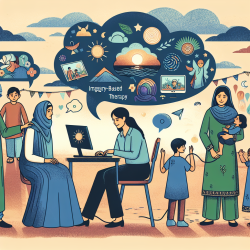Introduction
In the realm of speech-language pathology and therapeutic interventions, data-driven decisions are pivotal in creating effective treatment plans. Recent research highlights the potential of imagery-based therapy, specifically Eidetic Therapy, in managing PTSD among Pakistani women experiencing domestic abuse. This blog aims to explore the findings of a pilot study and discuss how practitioners can leverage these insights to enhance their therapeutic skills and outcomes.
The Study: An Overview
The study titled Possible Role for Imagery-Based Therapy in Managing PTSD in Pakistani Women Experiencing Domestic Abuse: A Pilot Study Using Eidetic Therapy was conducted to assess the efficacy of Eidetic Therapy in reducing PTSD symptoms in women subjected to domestic abuse. The research involved 40 women from outpatient clinics in Pakistan, who underwent 10-12 weeks of individual trauma counseling using imagery-based therapy principles.
Key Findings
- Significant reduction in PTSD symptoms was observed post-treatment.
- Improvement was independent of literacy levels, economic resources, or victim characteristics.
- Type of abuse, initial PTSD level, and years in the relationship were predictors of treatment gains.
Implications for Practitioners
The study underscores the potential of imagery-based therapy as a culturally sensitive and effective approach for PTSD treatment, especially in non-Western contexts. Practitioners can consider integrating imagery techniques into their therapeutic repertoire, particularly for clients with limited verbal skills or those from diverse cultural backgrounds.
Encouraging Further Research
While the pilot study provides promising results, further research is necessary to validate these findings across larger and more diverse populations. Practitioners are encouraged to collaborate with researchers to explore the broader applications of imagery-based therapy and contribute to the growing body of evidence supporting its efficacy.
Conclusion
Imagery-based therapy offers a promising avenue for addressing PTSD in women experiencing domestic abuse, particularly in regions where traditional therapeutic approaches may face cultural and linguistic barriers. By embracing innovative and culturally attuned methods, practitioners can enhance their therapeutic impact and support positive outcomes for their clients.
To read the original research paper, please follow this link: Possible Role for Imagery-Based Therapy in Managing PTSD in Pakistani Women Experiencing Domestic Abuse: A Pilot Study Using Eidetic Therapy.










